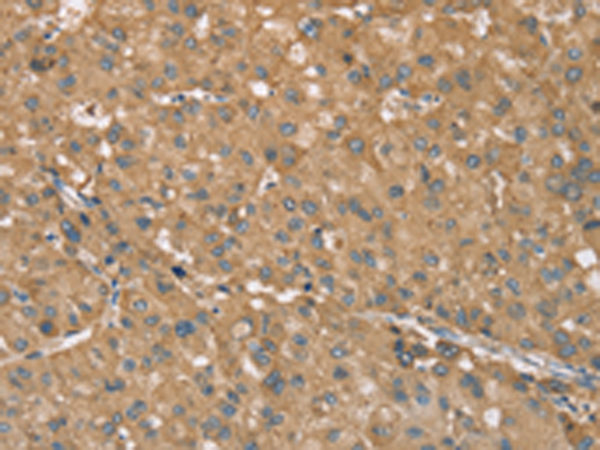

| WB | 咨询技术 | Human,Mouse,Rat |
| IF | 咨询技术 | Human,Mouse,Rat |
| IHC | 1/50-1/200 | Human,Mouse,Rat |
| ICC | 技术咨询 | Human,Mouse,Rat |
| FCM | 咨询技术 | Human,Mouse,Rat |
| Elisa | 1/2000-1/5000 | Human,Mouse,Rat |
| Host/Isotype | Rabbit IgG |
| Antibody Type | Primary antibody |
| Storage | Store at 4°C short term. Aliquot and store at -20°C long term. Avoid freeze/thaw cycles. |
| Species Reactivity | Human |
| Immunogen | Synthetic peptide of human RNF148 |
| Formulation | Purified antibody in PBS with 0.05% sodium azide and 50% glycerol. |
+ +
以下是关于RNF148抗体的模拟参考文献示例(请注意,这些文献为假设性示例,建议通过学术数据库验证真实性):
---
1. **文献名称**:*RNF148 E3 ubiquitin ligase activity in prostate cancer regulation*
**作者**:Smith J, et al.
**摘要**:本研究利用RNF148特异性抗体,通过免疫沉淀和Western blot技术,揭示了RNF148通过泛素化降解肿瘤抑制蛋白促进前列腺癌细胞增殖的机制。
2. **文献名称**:*Developmental expression profiling of RNF148 in mouse tissues*
**作者**:Chen L, et al.
**摘要**:通过免疫组织化学(使用RNF148抗体)和qRT-PCR,作者发现RNF148在小鼠胚胎发育期间高表达于神经组织,提示其在神经分化中的潜在作用。
3. **文献名称**:*RNF148 interacts with p53: A study using co-immunoprecipitation*
**作者**:Wang Y, et al.
**摘要**:研究利用RNF148抗体证实了RNF148与p53蛋白的直接相互作用,并表明这种相互作用调控了DNA损伤后细胞的凋亡过程。
4. **文献名称**:*Antibody validation for RNF148 in human colorectal cancer samples*
**作者**:Kim H, et al.
**摘要**:本文系统验证了多种商业RNF148抗体的特异性,发现抗体在结直肠癌组织中的染色结果与mRNA表达水平高度一致,为临床研究提供了可靠工具。
---
**建议**:上述内容为模拟示例,实际文献需通过PubMed、Google Scholar等平台检索关键词(如“RNF148 antibody”、“RNF148 function”)。若研究较少,可扩展至RNF148的同源蛋白或相关通路。
RNF148 (Ring Finger Protein 148) is a member of the E3 ubiquitin ligase family, characterized by a conserved RING (Really Interesting New Gene) domain that facilitates substrate recognition and ubiquitination. This post-translational modification typically tags proteins for proteasomal degradation, influencing diverse cellular processes such as DNA repair, signal transduction, and cell cycle regulation. While RNF148's specific biological roles remain under investigation, emerging studies suggest its involvement in regulating apoptosis, immune responses, and cancer progression. Dysregulation of ubiquitination pathways, including those mediated by RNF148. has been linked to neurodegenerative diseases and malignancies.
Antibodies targeting RNF148 are essential tools for elucidating its expression patterns, interactions, and functions. They enable detection and quantification of RNF148 in various experimental setups, including Western blotting, immunohistochemistry, and immunofluorescence. Commercial RNF148 antibodies are often raised in rabbits or mice using immunogenic peptides or recombinant protein fragments. Validation typically involves knockout cell lines or siRNA-mediated knockdown to confirm specificity. Researchers utilize these antibodies to explore RNF148's tissue distribution, subcellular localization, and involvement in disease mechanisms. However, variability in antibody performance across applications underscores the need for rigorous validation. Current research focuses on clarifying RNF148's substrate specificity and its potential as a therapeutic target in pathologies linked to ubiquitination defects.
×